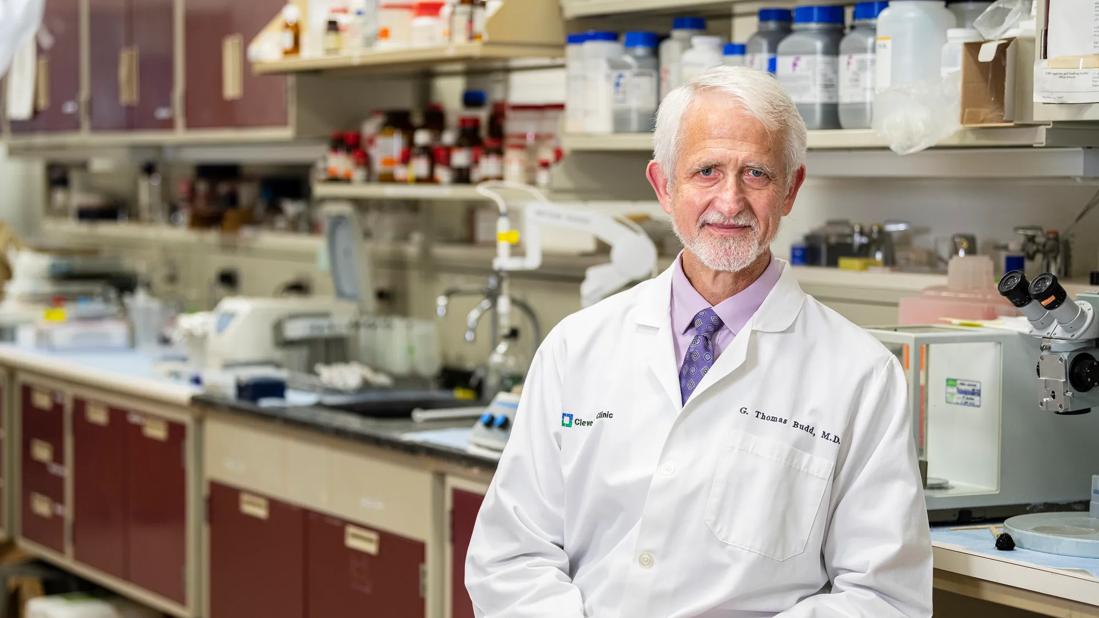Additional fine-tuning and recruiting of new patient groups underway

Image content: This image is available to view online.
View image online (https://assets.clevelandclinic.org/transform/8f2e5f40-ed3d-42e4-b118-8ac31ee10170/CCC_2254008_07-13-21_065_SG-jpg)
23-CNR-4371811-CQD-Hero-650×450
Current results from the phase 1 clinical trial of a novel vaccine under investigation at Cleveland Clinic were presented at the San Antonio Breast Cancer Symposium on December 6, 2023. The trial was created to determine the vaccine’s safety and dosage profiles in patients with early triple-negative breast cancer (TNBC) and is funded by the U.S. Department of Defense.
Advertisement
Cleveland Clinic is a non-profit academic medical center. Advertising on our site helps support our mission. We do not endorse non-Cleveland Clinic products or services. Policy
The ultimate goal of the vaccine is to prevent TNBC, the most aggressive and lethal type of breast cancer. The theory behind the vaccine is called “the retired-protein hypothesis, and was advanced by the late Vincent Tuohy, PhD, who was an immunologist at Cleveland Clinic’s Lerner Research Institute.
“The hypothesis is there are proteins that are produced in the body only at specific times and in specific tissues and not at other times and in other tissues,” says G. Thomas Budd, MD, an oncologist at Cleveland Clinic Cancer Institute and the trial’s lead investigator. “Those proteins are over expressed in some cancers largely derived from the tissues in which the protein is normally expressed.”
The protein α-lactalbumin “is made in lactating breasts, but not at other times or in other tissues,” says Dr. Budd. In women past child-bearing age, α-lactalbumin is no longer expressed and is thus undetectable in normal, aging breast tissue. However, α-lactalbumin is expressed at high levels in more than 70% of TNBC tumors, and less frequently in some other breast cancers as well.
Dr. Tuohy’s research found that targeting α-lactalbumin in murine models was effective in preventing breast tumors and inhibited growth of existing breast tumors. These outcomes inspired the vaccine’s invention. “We are developing a vaccine against α-lactalbumin, trying to attack those cancer cells that make too much of this protein, thinking that because the protein is not being made unless the woman is lactating, then it should be safe,” Dr. Budd says.
Advertisement
The purpose of this phase 1 clinical trial is to determine the dose to use in future studies. “To prove that the vaccine works takes a big study, but the first step is to get the dose right,” says Dr. Budd. “That usable dose will be based on side effects and the ability to incite an immune response against α-lactalbumin.”
The side effects of the vaccine in the trial have all been local injection site reactions. “At the higher doses, these reactions are not acceptable; at the lower doses, they are mild and acceptable,” Dr. Budd says.
Though they have a usable dose level, Dr. Budd and his team are still trying to fine-tune it by exploring additional variations of the doses of the two components of the injection.
More than half of the patients in the trial produced T-cell responses against α-lactalbumin based on ELISpot assays.
“We’re looking specifically at the ability to induce T-cells to produce interferon gamma or IL-17,” says Dr. Budd. “Humoral responses have not been major, but we think that the T-cell response is more important and we’re defining the dose based on the ELISpot response.”
The trial has been studying patients with a history of early-stage TNBC who have completed treatment but are at risk of recurrence and are within three years of diagnosis or initiation of treatment.
Now the research team is accruing two new groups of patients, some of whom will start within the next month.
The first group is cancer-free patients who are at genetic risk for breast cancer and have elected to undergo bilateral prophylactic mastectomy. These are primarily women with BRCA1, BRCA2 and PALB2 mutations.
Advertisement
“These patients will still undergo their planned surgery, which is of demonstrated utility, but we will vaccinate them, look at their immune response, and look for any evidence of inflammation in the resected breast tissue,” Dr. Budd says. “This is a safety study too because we worry there could be inflammation in the breast if there are areas of lactation that are undetected and unsuspected.”
The second group includes patients with early-stage TNBC who have received preoperative chemoimmunotherapy and surgery and are being treated with pembrolizumab postoperatively. They still have residual cancer in the breast tissue, making them at risk of recurrence due to possible microscopic metastases.
“These patients routinely receive immunotherapy with pembrolizumab postoperatively, so we will be giving the vaccine concurrently with the pembrolizumab,” says Dr. Budd.
Dr. Budd’s long-term hopes for the vaccine are that the risk of recurrence can be reduced in patients with TNBC and that the risk of getting TNBC at all can be decreased. “But I emphasize long-term,” he says, noting the lengthy process involved.
Additional studies are being planned, including a randomized trial in patients who have residual cancer in their breast after preoperative chemoimmunotherapy and surgery, Dr. Budd says. These patients would all receive standard-of-care immunotherapy with pembrolizumab and then be randomized, with half receiving only immunotherapy and half receiving the α-lactalbumin vaccine along with immunotherapy.
Advertisement
“This would allow us to see whether the α-lactalbumin-treated patients did better than those who are getting standard-of-care treatment alone,” says Dr. Budd. “We would also like to launch a prevention trial, but that’s further off.”
For more information and participation criteria, visit clinicaltrials.gov.
Advertisement
Advertisement
Phase 1 study demonstrates immune response in three quarters of patients with triple-negative breast cancer
Reconsidering axillary lymph node dissection as well as depth of surgical margins
Ultra-Hypofractionated Whole Breast Irradiation and Partial Breast Irradiation Reduce Many Toxicities
Best practices for reducing toxicities
Partnerships with local social service agencies key to program success
Ongoing clinical validation refine breast cancer risk substratification
Phase 3 trial found no survival differences between weekly or biweekly doxorubicin/cyclophosphamide or between weekly or biweekly paclitaxel
Findings strengthen evidence for risk-reducing procedures